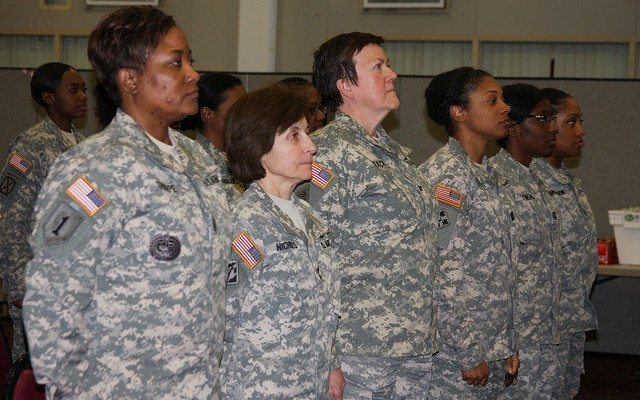
Blogs
Forum Film Festival Series: Part 2 – The Invisible War
More than 20 percent of women in the armed forces have experienced sexual misconduct in the military. Due to fear of backlash, this statistic is significantly under reported. In the last year, however, reported sexual assaults in the military increased an unprecedented 46%.
Senators Kirsten Gillibrand (D-N.Y.) and Rand Paul (R-Ky.) have truly made bi-partisan efforts to shed light on this national travesty. Sen. Gillibrand recently predicted that the current Military Sexual Assault Bill, which would remove sexual assault cases from the chain of command, will receive the necessary votes to pass.
The efforts of Sen. Gillibrand and others fighting for reform, particularly to take military oversight of sexual assault cases out of military hands, is increasingly gaining attention and steam. The Invisible War, a groundbreaking documentary directed by Kirby Dick, helped make waves on the road to reform, expanding awareness of the critical issue. Two of the women featured in the film, attorney Susan L. Burke and former Airman First Class Jessica Nicole Hinves, joined the Forum on Law, Culture and Society at Fordham Law School for the Forum Film Festival to discuss the issues raised by the film and the steps needed for reform and to pass the Military Sexual Assault Bill. Moderator Thane Rosenbaum, film executive producer Maria Cuomo-Cole, and Rear Admiral Susan J. Blumenthal rounded out the panel.
(All statistics in the film are from U.S. Government Studies)
The Invisible War addresses the rampant under-reporting of sexual harassment in the military. Female soldiers are more likely to be raped by a fellow soldier than be killed in action. In addition, women who have been raped in the military have a higher rate of post-traumatic stress disorder (PTSD) than men who have been in combat.
In fact, about 80% of sexually assaulted men and women do not report. Yes, I said men and women, as male victims comprise approximately one percent, or 20 thousand cases, of all military sexual trauma.
A study by the United States Navy included in the film asserts that 18 percent of incoming recruits have attempted or committed rape before entering the military. An alarming statistic considering that we hold our military to such high standards and expect a certain degree of oversight. Twenty-five percent of women do not report rape because their commanding officers are the rapists. Due to the chain of command disciplinary system, prosecution of these attacks is entirely at the discretion of the military and the commanding officers are in charge. Although Congress has the power to exercise congressional oversight over these military sexual misconduct situations, few members have chosen to become involved until recently.
Susan Burke suggested that the military justice system is flawed and must be modernized. “Put the adjudicatory power in the hands of the prosecutors – not the commanders,” she stated.
The problems with sexual misconduct in the military is not new. As the film points out, in 1991, the Navy dealt with sexual misconduct issues with regard to the Tailhook Convention in which approximately 200 Navy and Marine airmen participated in “The Gauntlet”. This involved men roaming the halls in search of women to assault. “The Gauntlet” ending with the sexual assaults of hundreds of women.
The embarrassing events that took place at the Tailhook Convention in 1991 are absolutely unacceptable; however, such conduct did not end there. In 1996, the Army dealt with sexual misconduct at the Aberdeen Proving Ground involving the rape and sexual harassment of 30 women. In 2003, the Air Force dealt with sexual misconduct within their Air Force Academy in Colorado Springs. Most recently, there was a scandal involving the rape of a Marine stationed at the Marine Barracks in D.C., a very reputable place to be stationed due to its proximity to the U.S. Capitol building.
Many of the resulting lawsuits and prosecutions in these sexual misconduct cases often end in a form of insignificant justice. In Jessica Nicole Hinves’ case, the man who was under investigation actually received a promotion. Many of these lawsuits end poorly, partially due to the Feres Doctrine which states that the U.S. government is not liable for injuries sustained during service (including rape, apparently).
Additionally, a December 2011 lawsuit was dismissed because the court claimed that sexual harassment is “an occupational hazard of military service.” This seems outlandish, outrageous and absolutely upside-down. Since when is rape and sexual misconduct part of the job description when enlisting in the military to serve our nation and protect our freedom? What’s next, barcodes on every American citizen’s neck as a residential hazard of living in the United States?
Even with bills such as the STOP Act aimed at rectifying the many injustices our service people endure when it comes to sexual assault, many still wonder if it will be enough. According to, Jessica Nicole Hinves, this type of moral erosion is a national security issue, as military feminism is looked down upon by higher ranking commanders.
Holding servicemen accountable for the sexual misconduct they perpetrate is essential in order to maintain the respectable and cohesive nature of our military. Resistance to oversight legislation aimed at removing military sexual assault cases from the chain of command is at odds with the military’s insistence that in order to maintain good order and discipline, commanders need to maintain leadership, control and power.
The panel suggested that military justice can and must be effected through civilian control, encouraging audience members to tell their Congressional representatives that commanders must be held accountable and that higher ranks do not put people in a position to make legal determinations about sexual assault. Countries such as England, Australia and Israel have taken the oversight out of military hands. Therefore, perhaps it is time the United States follows suit.
—
Rob Anthony is a founding member of Law Street Media. He is a New Yorker, born and raised, and a graduate of New York Law School. In the words of Supreme Court Justice William O. Douglas, “We need to be bold and adventurous in our thinking in order to survive.” Contact Rob at staff@LawStreetMedia.com.
Featured image courtesy of [U.S. Army IMCOM via Flickr]








Comments